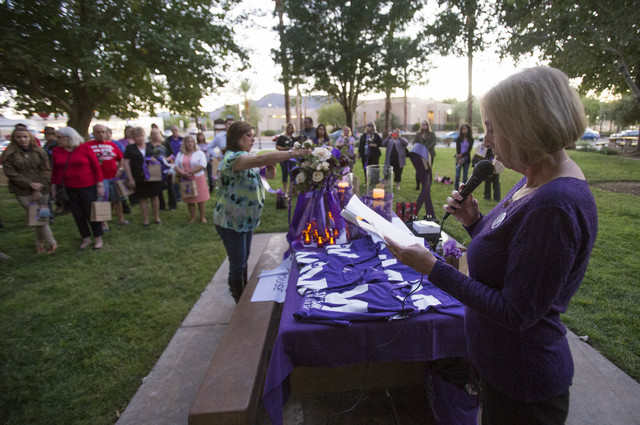Mental effects of domestic violence can linger long after physical wounds heal
Long after leaving a domestic violence situation, a person can still experience trauma, which often manifests in mental health issues.
“When a person is traumatized, the experience gets stored in their memory,” said Sandra Dietrich-Hughes, clinical director of SAFE House. “Then some sound or smell could trigger it. It may go away, or it may stay there for years.”
Many survivors experience post-traumatic stress disorder (PTSD). “They can experience sleeping issues, nightmares, eating disorders,” Dietrich-Hughes said. “It just depends on the situation.”
For domestic abuse survivor Nancy Slater, the first few years after she left her husband had her getting in a habit of looking over her shoulder. “I would always look in the rear-view mirror as I drove to make sure he wasn’t following me,” she said.
One of her last incidents of physical abuse happened in an elevator. She told her husband she was leaving and stepped inside.
“Then I realized he was in there with me,” she said.
He attacked her, leaving her black and blue. Even though she was able to escape, she was unable to get into an elevator for years afterward.
She said the PTSD has since subsided. “But still sometimes I get uncomfortable if someone is standing a little too close to me in line,” she added.
Gina, another abuse survivor who asked to withhold her last name, has spent years rebuilding her self-esteem and self-worth after her husband used his fist and words to break it down during the 16 years she was with him.
“It’s been a long process,” she said. “I know that God loves me and that I’m not junk.”
The first few years after her divorce, she attended counseling multiple times a week. Though she has made progress, she still has anxiety at times.
“I’m on antidepressants, which I’ll be on for a long time,” she said. “It’s just something I know I need to do.”
She has since remarried, and even though her current husband is sensitive to her needs, sometimes Gina’s anxiety gets the best of her.
Dietrich-Hughes said when survivors come to SAFE House, they get evaluated for PTSD and other issues such as anxiety and depression. Each circumstance can result in a different course of action from medication to counseling.
“Part of the evaluation is to help them determine tension-reducing behaviors,” she added.
It’s not just the physical abuse that wears people down. The psychological abuse also can take its toll years after the incident.
As part of counseling, Dietrich-Hughes said they help survivors to develop healthy boundaries, build strong support systems and utilize health coping mechanisms. She added that even when survivors move on from counseling, SAFE House never closes the case.
“We have had clients return a year or two years later, or longer,” she said.
Both Slater and Gina have found it therapeutic to share their stories. While Slater has spent more time talking to groups, Gina finds time to speak one-on-one to other women.
“I’m not ashamed of my story,” she said. “Whatever I can do to empower other women.”
To reach Henderson View reporter Michael Lyle, email mlyle@viewnews.com or call 702-387-5201. Find him on Twitter: @mjlyle.




























